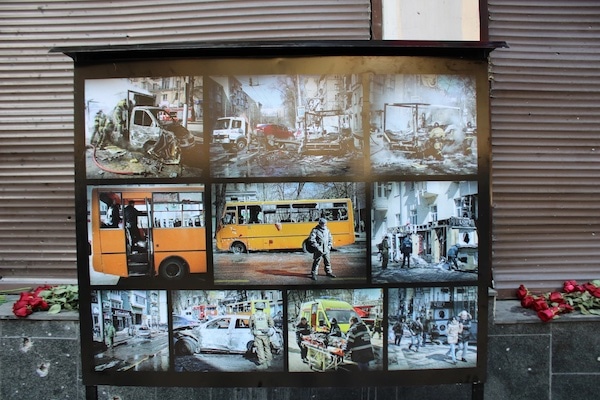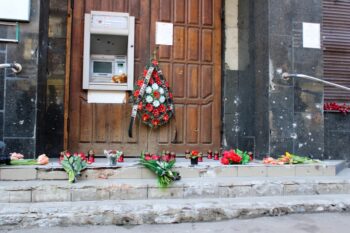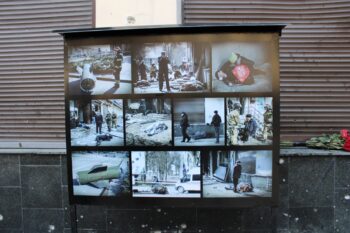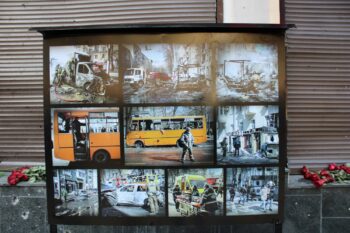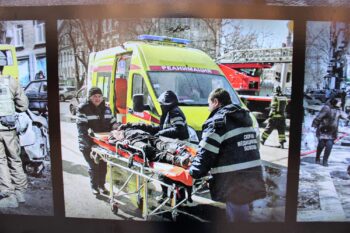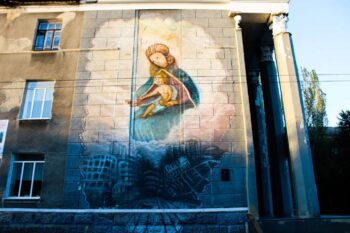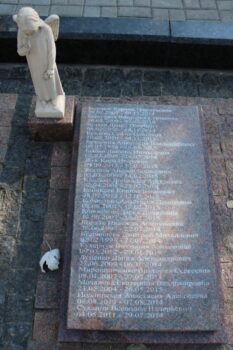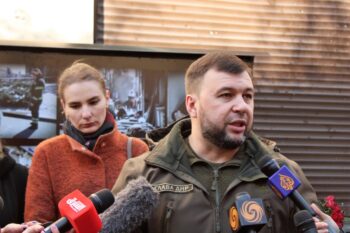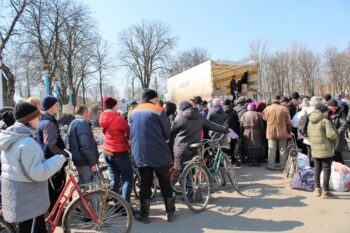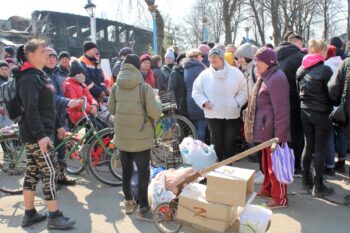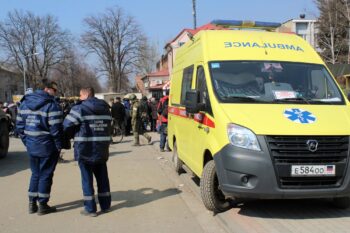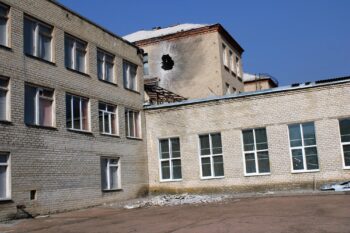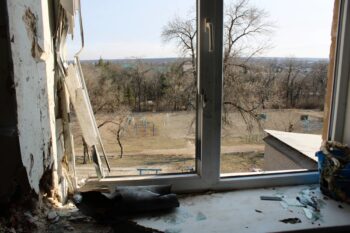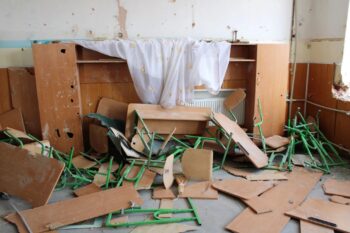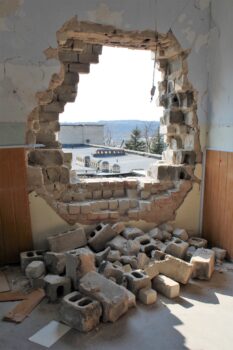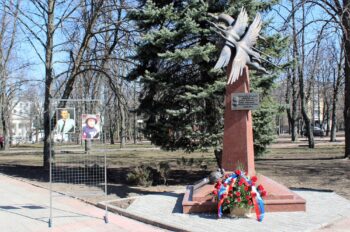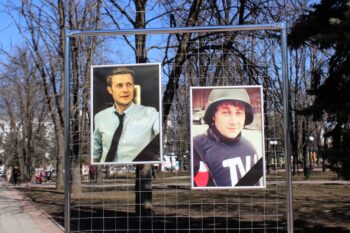*Following is a lengthy overview of my recent re-visit to the Donbass, on a two day media delegation, with a brief critique of some of the media’s slanted reporting. It is also a follow up from my 2019 visit to hard hit areas of the Donetsk People’s Republic. It is now 8 years of Ukraine’s war on the people of the Donetsk & Lugansk Republics.
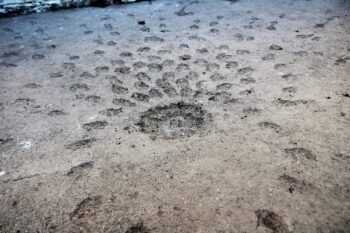
Point of impact of March 14 Ukrainian missile attack on Donetsk. (Photo: Eva Bartlett, March 24, 2022.)
In the last week of March, I stood on a central Donetsk main street next to two of the impact points of a Ukrainian missile attack that had killed 21 civilians and injured nearly 40 more on March 14. The Donetsk People’s Republic (DPR) maintains that their military intercepted Ukraine’s Tochka-U ballistic missile, and that not all of the cluster munitions inside had exploded in the city streets, thereby lessening the already terrible bloodshed it caused. Indeed, if all of the munitions had exploded, it would have been a bloodbath more horrific than the 21 killed.
Near the ATM, there were flowers and candles laid in memory of the civilians murdered that day, with haunting photos nearby depicting the aftermath of the bombing, the grisly scenes of the dead and the maimed—scenes you will generally never see blasted across Western corporate media, just as the same media were silent when terrorism struck civilian areas in Syria.
I’m intimately familiar with war zones, and with Western corporate media’s white-washing of the perpetrators’ crimes (Israeli crimes against Palestinians; Western-backed terrorists’ crimes against Syrians; Ukrainian military and Nazi crimes against the civilians of the Donbass—and also against Ukrainians proper), so the lack of media coverage on this recent Ukrainian war crime doesn’t surprise me.
They don’t report on it, or the myriad Ukrainian war crimes prior, because it doesn’t suit their narrative, a narrative that erases the eight years of Ukraine’s war against the four million people of the Donbass republics, killing at least 14,000 people, to give a modest estimate.
War crimes investigator, Ivan Kopyl, spoke about Ukraine’s March 14 attack, noting,
The warhead of a Tochka-U missile contains 50 cassettes of cluster munitions. We managed to find 28 traces of cluster explosions on the soil… A Tochka-U missile changes its orientation just before landing, so after it flies on a trajectory it makes a turn and falls vertically down before detonating at a certain height. The fragments then shower the surface in a radius of approximately 150 meters.
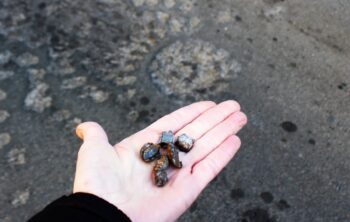 I have one of those cluster fragments, a twisted and jagged square-shaped piece of metal—seemingly harmless looking on its own, but deadly when flying through the air at high speed, in great numbers.
I have one of those cluster fragments, a twisted and jagged square-shaped piece of metal—seemingly harmless looking on its own, but deadly when flying through the air at high speed, in great numbers.
The attack occurred around noon, when this central city street—not a military area, but a civilian one—would have been busy. Photos show a gutted bus and gutted cars. Pensioners, Koply noted, would have been lined up at the ATM right where the blasts occurred. “There was also damage to a yard where there are two kindergartens – there were several craters there,” he noted.
The strike on the heart of the city is among the latest in Ukraine’s litany of war crimes.
Ukraine again bombed Donetsk following the March 14 attack. Donetsk News Agency reported on March 30 that the Ukrainian forces’ bombing had killed one person and seriously injured four others. One of the girls injured in that attack fell into a coma, the DPR Ombudsman noted.
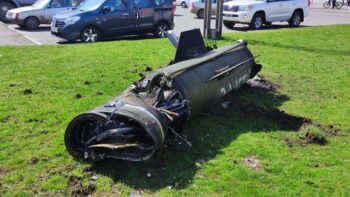 And just now, there’s been news of another Ukrainian Tochka-U attack. According to RT, at least 50 people (including 5 children) were killed at a railway station in Kramatorsk, where thousands of people were waiting for evacuation trains. Eduard Basurin, a representative of the DPR People’s Militia, stated that the attack was a missile containing prohibited cluster munitions.
And just now, there’s been news of another Ukrainian Tochka-U attack. According to RT, at least 50 people (including 5 children) were killed at a railway station in Kramatorsk, where thousands of people were waiting for evacuation trains. Eduard Basurin, a representative of the DPR People’s Militia, stated that the attack was a missile containing prohibited cluster munitions.
Gonzalo Lira writes:
This is a fragment of the missile that hit the Kramatorsk train station…The AFU has blamed the Russians, but this picture of the missile shows that it is indisputably a Tochka-U rocket — used exclusively by the Ukrainian side. It’s the same kind of missile that two weeks ago hit the center of Donetsk and killed 27 civilians.
What’s that saying? Once is an accident, twice is a coincidence, three times . . .
As of March 31, the Ombudsman reported that there’s been 6,010 deaths, including 96 children, since Ukraine’s war began in 2014. And that’s only with regards to the DPR. In the Lugansk People’s Republic (LPR), which has also been under Ukrainian fire since 2014, as of late February, 1,762 civilians had been killed, including 35 children.
During my 2019 visit to the DPR, I went to the northern city of Gorlovka, of which I wrote:
Gorlovka was hardest hit in 2014, especially on July 27, when the center was rocked by Ukrainian-fired Grad and Uragan missiles from morning to evening. After the dust settled and the critically-injured had succumbed to their wounds, at least 30 were dead, including five children. The day came to be known as Bloody Sunday.
A monument commemorates the Gorlovka victims of Ukrainian bombings and sniping from 2014-2017. Near a sculpture of an angel, over 230 names fill the marble slabs, the first dedicated solely to children, 20 of them.
At the site of the March 14 bombing, DPR head Denis Pushilin spoke, outlining the chronology the last 8 years, from the violent coup in Ukraine and subsequent increase in radical Ukrainian nationalism, to the two republics’ decision to push for autonomy, to Ukraine unleashing hell on the 4 million people and continual violations of the (2014 & 2015) Minsk Agreements and the massive amounts of weapons pumped from the West to Ukraine (see also). [*Note: I’ll be adding a subtitled clip of his words in the next day or two.]
School and Hospital shelled by Ukrainian forces
The town of Volnovakha—on the road between Donetsk and Mariupol further south—was secured by DPR forces nearly two weeks prior to our visit. Entering the town, we passed destroyed homes and buildings, which was expected, as there was heavy fighting to liberate the area held by the Ukrainian forces.
As they did in their copy-paste reporting on liberated areas of Syria, most Western media reports on Volnovakha focus on the destruction, without any context as to why it occurred—these residential areas were occupied by Ukrainian forces, and not all of the destruction was from DPR forces’ fighting against the Ukrainian forces: the Ukrainian forces themselves fired on homes, and according to hospital staff, on the hospital itself.
In addition to not giving this context, most Western media in general depict the liberating forces as deliberately and wantonly destroying everything in sight. Some media went as far as to claim that Putin himself had destroyed the town. This cartoonish narrative, so prevalent in Western reports whitewashing terrorism in Syria and now in whitewashing Ukrainian forces’ crimes, unfortunately does achieve its intended effect: duping Western viewers into believing the opposite of reality–that the liberators are the war criminals.
Again, just as terrorist factions in Syria occupied schools and hospitals, so too do Ukrainian forces, including in Volnovakha. When DPR forces had liberated the city, they found foreign weapons used by Ukrainian forces inside the hospital.
In a central area of Volnovakha, Russian soldiers handed out humanitarian aid to lines of residents, including: bags of canned goods, fresh bread, water.
According to Alexander Yurievich Kachalov, the interim mayor, Ukrainian forces used civilians as human shields.
They made sure to destroy as much infrastructure as possible. They bombed buildings in order to leave ruins after they left, to make it harder for us to restore.
This was common in Syria. Terrorist factions destroyed buildings and vehicles when fleeing, while leaving mines and booby traps on streets and in houses, to kill still more civilians and soldiers.
A woman waiting in line for humanitarian aid said, “They say Russia did this. This wasn’t Russia, Ukraine did it, destroyed everything here! They shot at our hospital. I work there. The new children’s and infection units have been destroyed. The outpatient clinic was destroyed. And then they left. They took the medical staff’s car and went away.”
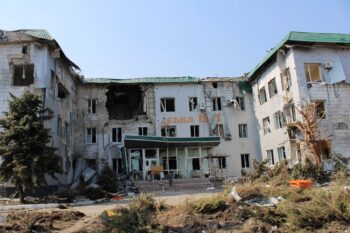 At the destroyed hospital, Chief Physician, Viktor Fedorovich Saranov, said:
At the destroyed hospital, Chief Physician, Viktor Fedorovich Saranov, said:
“[The Ukrainian Army] were there. There were tanks on our territory. There were guns and Grads outside the territory. I asked them to act in accordance with the Hague and Geneva conventions. I asked them to leave the hospital. They said it was war.
Many people come to us from nearby houses under fire. About 500-600 people came to our basement. We gave everyone three meals a day.
The second and third floors were occupied here. We were preparing for a long siege, and then it turned out like this: they conducted an attack. They evacuated the soldiers. And they mined the entrance to the intensive care unit. On the last day, when they were leaving, they shot at the intensive care unit.” The ICU, he said, had already been evacuated.
A woman who said she had worked at the hospital as a nurse for nearly 58 years said:
On the 28th I was home alone. They soon started shelling. How can they do it with their local hospital? With patients here. They were laying in corridors, as they had been evacuated. They said there was no one in the hospital, no staff, no patients. This is a lie.
Later, researching, I came across this news (*warning, graphic video at the link):
Foreign mercenaries who were wounded in the Volnovakha hospital were shot by their own before leaving the city so that they could not tell anything. All the wounded have a control shot in the temple or the back of the head.
On the road back towards Donetsk, we stopped at a school that had been shelled in late February.
According to Victoria Terichenko, head of the Dokuchaevsk city administration’s Department of Education, the shelling was by Ukrainian forces.
“Of course, Ukraine. There were only Ukrainian troops there. We had no military here, we were only civilians here.”
Fortunately, children weren’t at school at the time of the shelling, but Terichenko said a nursery school in the area had been shelled, with children inside, but again, fortunately, not on the side of the building shelled.
Horrors of Ukraine’s War on the People of the Donbass Republics
Ukraine’s relentless bombing and sniping of the people of Donbass is bad enough, along with it being ignored by Western press and politicians.
But in its eight years of warring on a people who rejected the rule of ultra-nationalists and Nazis, who just wanted to live autonomously, speak their own language, remember their history (Ukraine has rewritten history to glorify Nazis and Nazi collaborators and to vilify those who defeated Nazism, namely the Soviets), Ukraine has committed war crimes as heinous as ISIS and their co-terrorists in Syria, with more and more testimonies coming out of mass graves, rapes, torture of civilians and Donbass soldiers, beheadings. None of this shocking given the crimes these extremists commit against even Ukrainian civilians and journalists.
Along a sidewalk flanking a central park, there is a row of photos containing incredibly disturbing images of murdered LPR civilians.
Elders slaughtered on benches and in wheelchairs, the corpse of an infant, mass graves, a room used to imprison and torture people, the insignia of the notorious rapists and murderers of the “Tornado” battalion.
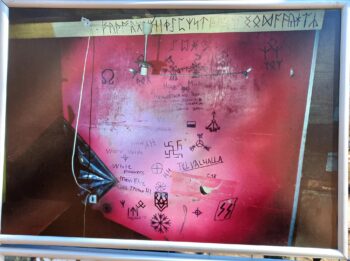 One photo shows Nazi graffiti left on a wall.
One photo shows Nazi graffiti left on a wall.
These are similar to the graffiti I saw in January 2009 left by Israeli soldiers who occupied the home of a Palestinian family, half of which had been killed by Israeli-fired White Phosphorous. One of the slogans written in Hebrew was: “Next time it will hurt more.” This, to the family whose infant had burned alive due to the White Phosphorous bombing, and whose surviving family members were badly mutilated from the prohibited weapon. In another house in eastern Gaza, likewise occupied and desecrated by Israeli soldiers, more hate and death graffiti had been left for the traumatized inhabitants.
Different people and places–same violent hatred of the population being targeted.
In the same park area, there is a monument to two journalists killed in 2014 by Ukrainian forces. Had these journalists been killed by Russia or Syria, their names would have been on the front pages of news sites and TIME magazine covers. In Syria, dozens of journalists have been killed by terrorist forces, to the silence of not only Western media but also of the groups supposedly advocating for journalists’ rights and safety.
In Shchastia, north of Lugansk, more civilians received humanitarian aid in the liberated town.
*Humanitarian aid being handed out in Shchastia, a town north of Lugansk, liberated in early March.
Western Delivered Weapons on Display
In the two republics, we saw some of the vehicles and weapons captured from Ukrainian forces. Telesur journalist Alejandro Kirk spoke to me about these captured weapons and vehicles, noting the many foreign made weapons sold to Ukraine. Western countries continue to sell weapons to Ukraine.
On March 20, journalist Alexander Rubinstein wrote of the West’s exorbitant shipping of billions of dollars in weapons to Ukraine over the years. He noted:
At least 32 countries have announced their intention to ship billions of dollars in weapons into Ukraine for use against Russian forces in Ukraine. Photographic evidence shows that these weapons have already ended up in the hands of neo-Nazi paramilitaries – units which have already received training and arms the US and its NATO allies.
All of this builds on $3.8 billion in military aid from the United States to Ukraine, the training of 55,000 Ukrainian soldiers by Canada and the United Kingdom, and a longstanding CIA program aimed at cultivating an anti-Russian insurgency.
…weapons furnished by NATO allies have been placed in the hands of the Azov Battalion, a neo-Nazi former paramilitary organization incorporated into the Ukrainian National Guard.
The governments of Canada, the United States and the United Kingdom have presided over a massive program to train and equip Ukrainian soldiers for a full-scale war with Russia. Trainees have included top commanders of the Azov Battalion.
In late February, the European Union opened the floodgates of weapon shipments to Ukraine, approving financing through the aptly-named “European Peace Facility” to reimburse countries sending weapons to the country to the tune of $500 million USD. Another $55 million USD is earmarked for non-lethal military aid.
This February, the State Department announced $350 million in additional military aid to Ukraine, bringing “the total security assistance the United States has committed to Ukraine over the past year to more than $1 billion.”
Another $200 million was sent in early March, and following Zelensky’s March 16 appeal to Congress for more weapons, Biden is reportedly set to dole out another $800 in military aid including 800 Stinger anti-aircraft systems, 9,000 anti-tank systems, 5,000 rifles, 1,000 pistols, 400 machine guns, 400 shotguns, 400 grenade launchers, 20 million rounds of ammunition, 100 tactical drones, 25,000 sets of body armor and 25,000 helmets. But that’s just the tip of the iceberg.
These figures add to the $2.5 billion in military aid the US delivered between 2014 and the summer of 2021, bringing the total to $3.8 billion.
A shipment of NLAW grenade launchers and instructors from #NATO countries arrived in #Kharkiv. The Azov regiment was the first to learn about new weaponry pic.twitter.com/CCzjN40rW7
— NEXTA (@nexta_tv) March 8, 2022
Missing Context: What the Donbass People Have Endured In 8 Years of Ukraine’s War
After my September 2019 visit to the DPR, I wrote about the mostly elderly civilians I met who were living in battered homes damaged by Ukrainian shelling and heavy machine gun fire just 500 meters and 600 meters from Ukrainian forces. They remained there, they told me, mostly because they had nowhere else to go. Some spoke to me on camera, others were afraid of Ukrainian retaliation were they to be interviewed.
But their stories were all pretty much the same: at night, when the observers of the Organization for Security and Cooperation in Europe (OSCE) left, the Ukrainian terrorizing began, with shelling throughout the night.
I also met a couple who had been living for 6 years in the stinking, dank, basement of a battered school, after Ukrainian bombing destroyed their home.
The DPR press officer who accompanied me and provided translations, spoke of how Ukrainian forces used weapons prohibited under the Minsk Agreements.
Dmitri, press officer of the DPR People's Militia, explaining the Ukrainian-fired shell found at home Zeitsevo resident.
According to him, Ukrainian forces ~600m from this point.More at this post:https://t.co/8G4MSrxwZs pic.twitter.com/wkYJMUoFiE
— Eva Karene Bartlett (@EvaKBartlett) September 13, 2019
Irina Dikun, head of the administration of Zaitsevo, another frontline village, spoke at length on the Ukrainian bombing that erupted nearly every night.
“They are destroying street by street in the town. They take one street and destroy it house by house. Then they turn to another street. There was a school, and a nursery school, before, but they were both destroyed by Ukrainian artillery.”
As in Syria, when schools and hospitals are actually destroyed (in Syria by terrorist factions), the same media that howls over militarized hospitals being targeted, the same media that also manufactures stories that never even occurred, is silent when the destroying is actually done, by Ukrainian forces.
In Zaitsevo, Irina explained fire trucks and medics couldn’t reach targeted homes, because the ambulances themselves became targets for Ukrainian forces (as happens in Gaza, where medics are targeted by Israeli forces, as I myself witnessed).
During that 2019 visit, I also interviewed some of the defenders of the DPR, painted by Western media as “separatists”, “pro-Russian forces” and other such descriptions meant to dehumanize. The same Western media so quick to humanize terrorists, including one who chewed the organ of a dead Syrian soldier.
One more relevant note from that visit: Dmitri asked what people in the West think about the fact there is a Nazi state in Europe. I replied that most people don’t know, because of the media whitewashing.
Which brings me to my recent return to the Donbass: I was curious to see whether the journalists on the same delegation as me would report truthfully, partial truths, or fabricated lies. As it turned out, my skepticism was warranted.
Distortions and Omissions of Some Western Media on the Ground in the Donbass
Telesur’s report gave the historical context needed to understand the present, including the coup in Ukraine, the active neo-Nazis in Ukraine (many of whom re entrenched in the Ukrainian army), the past eight years of Ukraine’s war on the Donbass, the 14,000 killed during these years, and the media blackout on the suffering of the Donbass people.
Sky News’ report was good, mentioning the civilians killed in Donbass by Ukraine’s war, including the March 14 attack and the school shelling, while also giving air time to the DPR’s Pushilin.
Neither of the two French channels’ (FranceInfo and TF1Info) reports on the delegation’s visit mentioned the March 14 Tochka-U attack, even though we visited the site & Pushilin spoke of it at length, much less the roughly 8,000 civilians killed in the two republics alone. I couldn’t find mention of the Azov or other Nazi battalions participating in the atrocities against the Donbass people, even though we heard about them and saw the graphic photo display in Lugansk. Their reports were framed as, “this is what Russia wants us to see,” regarding the humanitarian aid and reclaimed towns.
🔴 Le Kremlin a organisé ces dernières heures le premier voyage de presse dans le #Donbass, région d'#Ukraine où l'armée russe a réalisé ses plus fortes percées. @JeromeGarro était présent : notre envoyé spécial vous explique l'un des objectifs de cette opération, regardez ⤵. pic.twitter.com/3NN4cj6tRA
— TF1Info (@TF1Info) March 25, 2022
And of course, they focused greatly on the destruction, but not on the reasons for it, the implication being that the Russians and the “pro-Russian separatists” were responsible.
The chief physician of the hospital in Volnokava spoke at length and did specifically state the Ukrainian army had occupied the hospital, as did the nurse I cited, both of whom addressed the group of journalists.
FranceInfo’s mention of the hospital was framed as, “The Russians accuse the Ukrainians of having bombed it.” They included a few seconds of the chief physician saying he didn’t know who had done it, there were soldiers in the area, he didn’t know who.
But actually, the physician spoke to us for about several minutes, during which—as I wrote earlier—he did specifically talk about the presence of the Ukrainian army in the hospital.
One journalist asked: “Why did such destruction happen?” To which the chief physician replied, “I don’t know. They were military. And who they were: military, national battalions, army? I don’t know.”
That’s the bit France TV cherry picked, omitting his previous words about the Ukrainian army occupying the hospital, as well as omitting what he said afterwards: “There was Ukrainian territory on that side and the rockets were from that side. They mined the entrance to the intensive care unit. On the last day when they were leaving, they shot at the intensive care unit.”
Likewise, TF1Info included just a few seconds of the physician’s words on the Ukrainian cannons and machine guns at the hospital, but then followed up with the presenter’s caveat: it is one of the arguments often presented by the Kremlin—in spite of the fact that not only he, but the nurse and many people I encountered in the town specifically blamed the Ukrainian army for occupying the hospital and attacking it themselves when leaving.
If there were any further TF1Info reports from their journalist’s visit which might have included mention of Donbass’ dead, I couldn’t find them. Likewise, of FranceInfo.
This tactic of cherry picking quotes and omitting information is a standard corporate media war propaganda tactic and, unfortunately one seen over and over in Syria and elsewhere.
Journalist Vanessa Beeley wrote of one particularly horrific and sadistic terrorist massacre of 200 Syrian civilians, including 116 children, in April 2017, killed by an explosion as they were being evacuated from their terrorist besieged villages. She wrote of one traumatized woman who lost 20 family members (10 dead, 10 missing) having witnessed the attack.
“Then, after the filming session (by various agencies, including Dubai based Orient News & Qatari Al Jazeera) which lasted approximately ten minutes, she and the other parents were forced back onto the buses, at gunpoint, and locked inside. They had to watch, while the armed militia collected the dead, dying and mutilated bodies of their community’s children and flung them in the back of trucks and Turkish ambulances, before driving them away from their families in Rashideen.
Not one western media outlet questioned why these injured, dying and disoriented children were being piled on top of one another in the back of a truck that obviously belonged to Nusra Front.”
In fact, as they did routinely in their Syria coverage, media essentially relegated these dead civilians as unimportant, because their deaths didn’t fit the corporate narrative, even when civilians were repeatedly targeted by horrific terrorist bombings, mortars and missiles.
Global Media Abusing the Suffering of the Donbass to Further Anti-Russia War Propaganda, Just as They Did in Syria…
It is already bad enough that Western media generally don’t report on Ukraine’s relentless shelling of the Donbass, but all the more disgusting when it depicts a scene from the March 14 bombing of Donetsk as if it was a bombing of Lvov by Russia.
This isn’t the only instance. More recently, various Western media have used footage showing a multi-story apartment building in Donetsk that was bombed by Ukraine on March 30 to infer that the scene depicted was actually of Ukrainian areas that had been bombed by Russia. If you followed the war propaganda around Syria, you would be aware that this practice is common, not accidental.
And as with war propaganda on Syria, some media will use footage not even from Ukraine:
More propaganda 👀🙄👇🏻 pic.twitter.com/SVwn19G9Hr
— Suzanne Seddon (@suzseddon) March 15, 2022
I could add paragraphs of examples of how Western media did this in Syria, but for the sake of brevity will state simply that this is one of many deceitful and deliberate propaganda tactics used to both downplay the hell civilians are suffering under Ukraine’s bombing, and instead to pretend Ukraine is the victim. How the journalists that propagate such lies live with themselves, I’ll never understand.
Finally, a word to some in independent media who feel the need to denigrate Russia’s denazification operation in Ukraine by snidely putting “special operation” in quotation marks, or others who took to social media to tell the world they don’t like war, and denounced Russia for its military operation (to stop a war): The people of the Donbass don’t like war, they didn’t ask for Ukraine to unleash hell upon them. Such posturing disrespects the at least 14,000 killed by Ukraine’s war.
As journalist Roman Kosarev, who has covered the war eightyears, said: “Russia isn’t starting a war, Russia is ending one.“

